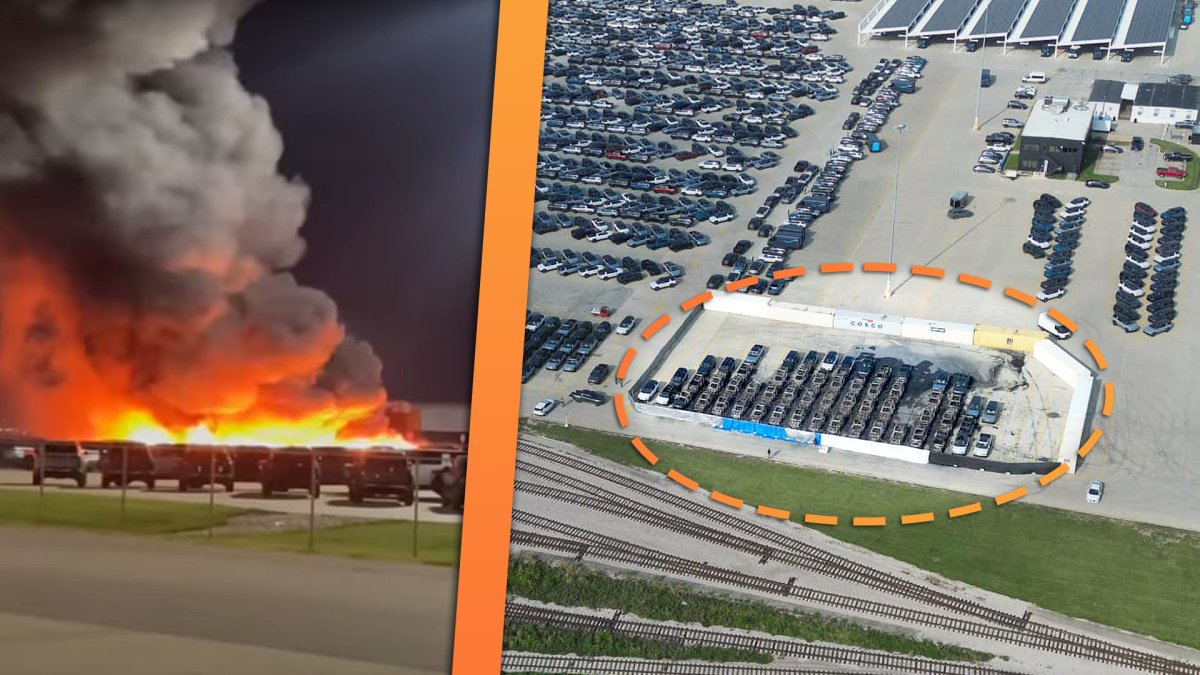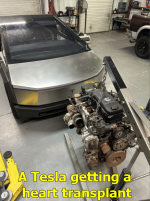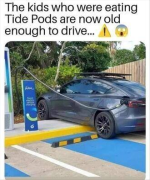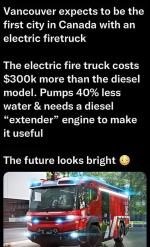You are using an out of date browser. It may not display this or other websites correctly.
You should upgrade or use an alternative browser.
You should upgrade or use an alternative browser.
Reality check on electric cars
- Thread starter Stringfellow Hawk
- Start date
And the ones who have had one and have never driven one are the experts. They will explain to EV owners what it is like. And they will tell those with experience what the problems are. They will not understand what is wrong with that viewpoint.Wow, three years of constant posts on how much you guys hate electric cars. That is a lot of hatred for an inanimate object that you do not even own.
T. A. Gardner
Serial Thread Killer
A fire at a Rivian plant broke out among 50 - 60 vehicles in a holding area...

 www.thedrive.com
www.thedrive.com
While the cause hasn't yet been determined, want to bet one of them had a battery fire?

Fire Outside Rivian Plant Torches 50+ Electric SUVs and Pickups
Some 50 to 60 Rivian R1T and R1S electric vehicles were lost after a fire broke out outside the company's Illinois facility over the weekend.
While the cause hasn't yet been determined, want to bet one of them had a battery fire?
gfm7175
Mega MAGA
$20k is being generous.Battery replacement is nothing like 20 k.
Nowhere near $20k.Do you know what an ICE engine replacement costs?
Nowhere near $20k.How about transmissions?
Real in that both have occurred once in a blue moon, but for all effective purposes they are never an issue for a vehicle owner. Engines typically last for decades (and even longer) with proper maintenance. Transmissions typically last for decades (and even longer) with proper maintenance. In Wisconsin, a vehicle's undercarriage/frame will rot out (due to road salt) long before any engine or transmission replacement would be necessary.These are real.
Thankfully, ICE vehicles don't require a dealership for repairs. Pretty much anyone can do repairs on them. EVs, on the other hand, require specialized dealerships to do repairs, which means its more expensive.They have shops that just replace them. https://www.bridwellautocenter.com/engine-replacement-cost/ Of course you have to factor in the time it takes in the cost. A dealer is far more expensive and many cars, the engines cost a fortune.
Try an EV car for sticker shock. One little teeny tiny accident and the whole car is totaled (due to damage to the battery).Try a luxury cr or sports car for sticker shock,
gfm7175
Mega MAGA
Vehicles in Wisconsin can quite commonly get to 250K miles before getting retired due to damage from road salt. The engines and transmissions still have plenty of life left in 'em!I've taken engines out to 400k, no problem. I've taken transmissions even further.
Routine maintenance can get you a long way.
Sybil has already admitted he doesn't maintain his car.
gfm7175
Mega MAGA
My 07 and 11 vehicles don't have near as much mileage (the 11 is around 142k, the 07 is around 63k), but I have no intention of changing them anytime soon either. They will get retired due to road salt damage before anything else.We have an 04 and and 09....both around 200K....we have no intention of changing anytime soon.
gfm7175
Mega MAGA
I don't hate electric cars. I just hate people trying to force me to drive them. Leave me and my "gas guzzlers" alone, and stop lying about how much "better" EVs perform overall than ICEs.Wow, three years of constant posts on how much you guys hate electric cars. That is a lot of hatred for an inanimate object that you do not even own.
gfm7175
Mega MAGA
I don't have to drive one or own one in order to know basic mathematics and know that I am being lied to by snake oil salesman.And the ones who have had one and have never driven one are the experts. They will explain to EV owners what it is like. And they will tell those with experience what the problems are. They will not understand what is wrong with that viewpoint.
A Chevy Bolt is said to have roughly 250 miles of range, per the snake oil salesman. However, it is recommended to only charge your battery up to 80% and to not let it discharge below 20% in order to properly maintain it. That means that your Chevy Bolt only has an effective range of 150 miles right off the bat... Then one has to factor in weather conditions, heating/cooling, lights, etc etc, and then 100 miles isn't unheard of. In fact, if temperatures get too extreme, then 0 miles can be quite common.
Into the Night
Verified User
...and three years of constant posts from the Church of the EV. That's a lot of preaching for an inanimate object that you want to force people to buy.Wow, three years of constant posts on how much you guys hate electric cars. That is a lot of hatred for an inanimate object that you do not even own.
Into the Night
Verified User
No tubes to connect that heart to!
No fuel tank! No induction port! No driveshaft!
Oh...and putting that thing in a Cybertruck won't make it look any better than something out of an 80's vintage video game.
Into the Night
Verified User
Paradox, Sybil.And the ones who have had one and have never driven one are the experts.
Physics doesn't change to your whim, Sybil.They will explain to EV owners what it is like.
Yup. Because you ignore them. Your religion prevents you from seeing your own problems.And they will tell those with experience what the problems are.
That's YOU, Sybil. DON'T TRY TO BLAME YOUR PROBLEM ON ANYBODY ELSE!They will not understand what is wrong with that viewpoint.
Into the Night
Verified User
Plus, of course, is the limited range and inconvenience of recharging, make the vehicle useless for anything other than a very expensive commuter car.$20k is being generous.
Nowhere near $20k.
Nowhere near $20k.
Real in that both have occurred once in a blue moon, but for all effective purposes they are never an issue for a vehicle owner. Engines typically last for decades (and even longer) with proper maintenance. Transmissions typically last for decades (and even longer) with proper maintenance. In Wisconsin, a vehicle's undercarriage/frame will rot out (due to road salt) long before any engine or transmission replacement would be necessary.
Thankfully, ICE vehicles don't require a dealership for repairs. Pretty much anyone can do repairs on them. EVs, on the other hand, require specialized dealerships to do repairs, which means its more expensive.
Try an EV car for sticker shock. One little teeny tiny accident and the whole car is totaled (due to damage to the battery).
one for your evaluation,Plus, of course, is the limited range and inconvenience of recharging, make the vehicle useless for anything other than a very expensive commuter car.

Japan finishes hydrogen with first ‘green fuel’: This engine ends all EVs worldwide
Japanese Toyota's new multi-fuel engine technology could revolutionize the industry by combining combustion with EVs for a sustainable future
 www.ecoticias.com
www.ecoticias.com
Into the Night
Verified User
A heat engine, and an internal combustion engine. It's big selling point is that it run on many different types of fuel. Hydrogen, gasoline, diesel fuel, etc.one for your evaluation,

Japan finishes hydrogen with first ‘green fuel’: This engine ends all EVs worldwide
Japanese Toyota's new multi-fuel engine technology could revolutionize the industry by combining combustion with EVs for a sustainable futurewww.ecoticias.com
Quite an induction system and engine compression design. Toyota could see great success with this engine. Of course what fuels it can use is somewhat limited to the fuel tank design.
Toyota has planes to combine this engine with hybrid vehicle designs, using a smaller battery (mainly for ballasting), and electric traction motors, somewhat like a diesel-electric locomotive does today.
Hybrids are not EVs. They are ICE cars. They have effectively unlimited range like any ICE car. They don't need recharging. Just fill 'em up at any fuel station (gasoline or diesel, take your pick!), or hydrogen, if you have the fuel tank for it. Same engine.
Toyota is marketing this as a 'green' engine, yet the photograph shows mostly chrome and aluminum and some black plastic parts. Perhaps the photographer is color blind and can't differentiate 'green' from anything else.
A lot will depend, of course, on the reliability of the engine. It's going to be hard to beat the reliability of the O4 design. Porsche wasn't an idiot, and Subaru putting a water jacket around his design wasn't an idiot either. This new engine from Toyota unfortunately looks like an inline design, a design with poor reliability (due to main bearing wear).
Subaru's Legacy engine was originally 1.8L, and the current one is 2.5L. This new engine is only 1.5L (optionally 2.0L), meaning it has much less total power in watts than Subaru's current engine. Hybrid vehicles are heavy for their power already (effectively using two or more engines and their associated weight for the same size car). Reducing engine size may be a real problem with performance.
In the end, of course, the market will decide, just as it decided EVs are not wanted in near enough quantity that the government is pushing for, or that EV religious idiots believe will happen.
ICEs burn at 20 times the rate EVs do. https://www.greencarstocks.com/stat...tric vehicle fires,catch fire compared to EVs.A fire at a Rivian plant broke out among 50 - 60 vehicles in a holding area...

Fire Outside Rivian Plant Torches 50+ Electric SUVs and Pickups
Some 50 to 60 Rivian R1T and R1S electric vehicles were lost after a fire broke out outside the company's Illinois facility over the weekend.www.thedrive.com
While the cause hasn't yet been determined, want to bet one of them had a battery fire?
T. A. Gardner
Serial Thread Killer
Tu quoque fallacy. There was a fire at a Rivian factory in a lot where 50 to 60 vehicles were parked. The cause was likely a battery fire (it is still under investigation), and that fire was intense enough to set every other vehicle in the lot on fire by progression. A single ICE vehicle fire is unlikely to end up burning down an entire lot of ICE vehicles.
I EVs need simple maintenance same as ICE vehicles do, no matter how proud EV owners are of not properly maintaining their vehicles.
Apart from windshield wiper fluid, tires and brakes; what are my "simple maintenance" tasks?
Genuinely curious. I know you won't answer because you don't know, but I'm curious if you will continue playing this silly game.



